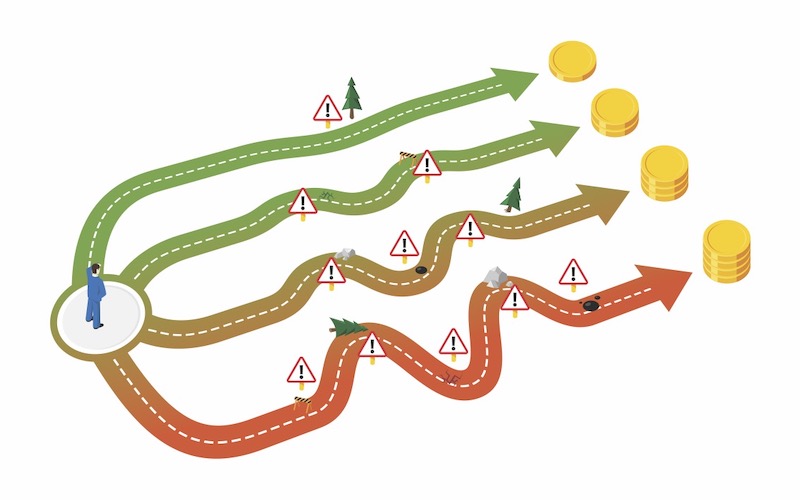
What Is Divergent Thinking: Definition and Common Examples
Table of Contents
Divergent thinking means seeking multiple interpretations of the information you gain, getting rid of old assumptions or common hypotheses, and always being resourceful and inventive. It allows you to shield away from prejudice and outdated views of the world and imply ingenious and unusual ways to overcome difficulties.
A divergent mind can be described as thinking beyond boundaries. It is also about the uncanny brain capability of coming up with ideas that are not limited by common traditions or established rules.
However, it is still more than just perceiving the world out of the box. Boundary extension is not about brainstorming or just fresh ideas. It is about non-stop curiosity and a strong willingness to learn and explore, diligence and patience to gain new experience, a desire to take risks, and the ability to solve a problem in the most unusual way that brings the most efficient output.
Suppose analytical and memory skills dwindle gradually, and you have noticed some thinking barriers. In that case, it is possible to hurdle them if nurturing your divergent type of thinking and tendency to overcome any cognitive limitations. This is because such limitations can block the capacity of your neurons to grow whilst the production of grey matter will also be decreased. And since the grey matter is critical for most brain functions, such as self-control, the capability of processing the sensory input and stimuli, and information encoding, it is pivotal to ensure its stimulation. Thus, grab your chance to discover what is divergent decision making, how to harness the power of your thinking, and how to nurture the skill of spontaneous generation of free-flowing ideas.

What is divergent thinking?
Some minds’ hardwiring probably can be considered standard. Suppose one tends to think without deviation from norms and rules. In that case, it means there is no creativity or diversity of thinking, imagination, visualization, and abstract thinking skills are poor. The decision or solution to a problem is based on constraints or biases. Thus, an individual will be seduced by a standard and systematic way of analyzing, and the process of solution generation will be limited, quite restrained, and not given to excess imagination. Of course, logic always must be present. However, sometimes, it can lead to narrowing down your ideas and solution. Looking at the world narrowly has nothing to do with divergent thinking.
People who can easily launch a divergent way of thinking are risk-takers and free-thinkers. They are not encumbered with mental barriers. They are independent and can fully rely on their thoughts. At the same time, they are not impinged by difficulties with their reasoning and can think logically while giving space to the wandering of the mind until an efficient, spectacular, uncommon solution is found. So the activity and art processes of music composers, poets, and painters are the best divergent thinking examples. Probably, scientists can also be divergent thinkers. For example, individuals who study metaphysics can not be limited in their cognitive processes and brain functions. Thus, divergence and boundlessness in thinking are essential components here. Based on this, it can be assumed that Stephen Hawking was indeed a divergent thinker. But obviously, he had a combined thinking style that allowed him to come to striking and impressive conclusions that still can evoke the mind of others.
Remember that our entire brain is in a constant state of work. It processes a flow of data and bits of important information through different paths (e.g., our senses) every second. Since our brain works hard to memorize, shape ideas, and create thoughts, we have to pay our brain the same and constantly work on its improvement. Cognitive practice and the development of multiple types of thinking with powerful brain aids and techniques definitely tend to yield a vast set of benefits. Let’s take a quick look at which benefits we attain if training divergent thinking regularly and whether it really can make out brains neuron-rich.

Divergent thinking yields impressive benefits!
Solving problems unconventionally means breaking all the mental barriers. This process must be fully controlled; otherwise, it can catalyze a disorganized mind. However, once you’ve gained total control over your thinking, even a spontaneous divergent mind will produce numerous perspectives to unleash limitless options to solve a particular problem. The benefits of such cognitive functions are a quick adaptation to the circumstances and the ability to deal with unforeseen events that life may throw at us more efficiently and cooled-headed. Changes will be embraced without any stress, as you will be sure that your mind will get you out of the most difficult situation. It allows you to see opportunities where others cannot see them.
Thus, you will be capable of improving your professional life, driving fresh ideas, and standing out from the crowd. Try never to cordon off or suppress even the strangest and most weird ideas, as they can be innovative, and no one will be able to bring them to the world except you. However, producing unexpected connections in the brain still may have some disadvantages, such as impulsiveness and irregular thinking patterns that can throw you off track, ruin plans, and lead to unreasonable conclusions. Be open and flexible but try to understand how you think and reinforce total control over your cognition.
How to implement divergent thinking?
For some individuals, their thinking can be a pleasant challenge, while others will have serious difficulties confronting the same thinking pattern that limits. So learning how to think in a divergent manner can be quite helpful for many life aspects, such as your daily life and routine or your career. However, getting stuck in slow decision-making and poor solving of issues, you must unpack ways how to gain a divergent mind and implement such skills.
Mind mapping might be just what you’ve been looking for, as it is the scientific-backed and proven way to reinforce your mind functions and keep your brain nurtured, healthy, and nourished. Training creation of mind maps can be a tedious activity, but you will definitely experience a brain power boost, enhance your divergent thinking, and even confront poor memorization and data retrieval. Another skill that you must pay attention to is probably building dissenting views. This skill is yet ignored, but its growth is essential in the modern world full of diversified information that can change and affect how and what we think. So holding some thoughts and having the courage to create opinions at variance with ideas that were commonly held can bring the desired intellectual output and enhance your independence in the digital era. Thinking more voluntarily without fear of being judged is possible also through constant brainstorming. It drives innovation, allows getting out form your head, and instills a thirst for new knowledge and a desire to learn and gain insights.

What about the psychology definition?
Psychology uncovers human types of cognitive behavior. This entails how a particular individual creates images, encodes details, discovers new information, builds associations, etc. The divergent mind is one of the thinking modes that can be considered quite unstructured and sometimes even chaotic but, at the same time, important for seeing several ways out of one pressing matter. Such multifarious solutions yielded by one thinking type can be applied to seek the most suited one after that quickly.
Test your divergent thinking
Most intelligence tests are designed to use only a linear type of thinking and logic. But, of course, tests of your creativity were also developed. With the divergent method of testing, first of all, imagination in combination with intelligence is used. It is suggested to turn off analytical thinking. One of the tests encompasses the task of listing as many ways of using the items as possible for the shortest period of time. Alternative use tests will allow you to understand the power of your ability to think beyond the ordinary.
FAQ
Is it possible to learn to think divergently?
A set of strategies exists to nurture a divergent mind. Thus, one can cultivate skills in a fun and engaging manner.
What is the opposite of divergent thinking?
Thinking aimed at solving tasks using a clear algorithm of actions is known as a convergent way of thinking. The success of solving the problem is evaluated by the speed, accuracy, and correctness of passing all stages of the solution deduction, while the divergent thinker tries to find more than one correct solution in various ways that are free from stereotypes.
Was Einstein a divergent thinker?
Many famous researchers, scientists, and inventors had strong divergent skills, and Einstein was one of them. The divergent mind of Albert Einstein can be described as thinking beyond boundaries. The complexity of his thoughts would need to be tested so; therefore, in each hypothesis, there needs to be a sliver of expansion beyond one’s own beliefs/boundaries. His brain capability came up with ideas that were not limited by common traditions or established rules at the time. Einstein won a Nobel Prize in physics and took many calculated risks to prove his theories. (i.e. E=mc^2)